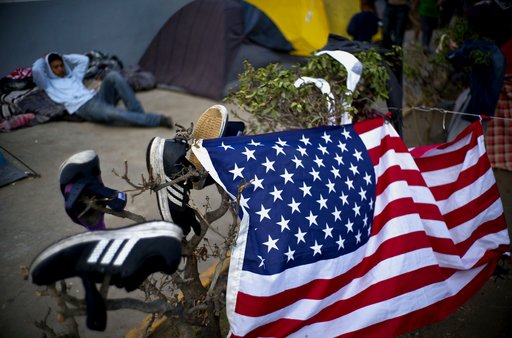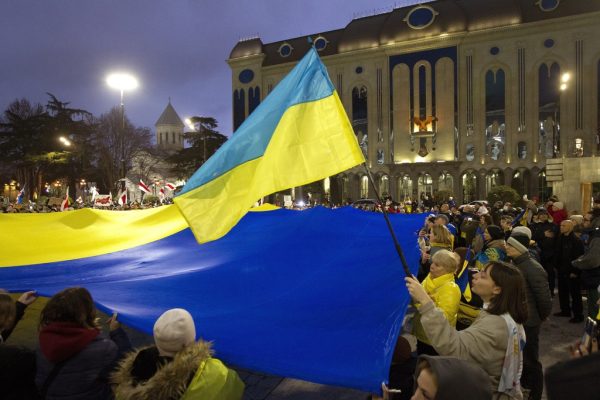EDITORIAL: America needs to examine the line between legality and morality

A migrant, part of the migrant caravan, rest next to U.S. flag and shoes drying in the sun, at a sports complex where more than 5,000 Central American migrants are sheltering in Tijuana, Mexico, Wednesday, Nov. 28, 2018. As Mexico wrestles with what to do with the thousands of people camped out in the border city of Tijuana, President-elect Andres Manuel Lopez Obrador’s government signaled that it would be willing to house the migrants on Mexican soil while they apply for asylum in the United States, a key demand of U.S. President Donald Trump. (AP Photo/Ramon Espinosa)
At this very moment, thousands of men, women, and children huddle in crowded shelters on the border of the United States. Many are families, fleeing corrupt governments and violent streets. Parents carry their children on their backs, wanting nothing more than for them to have a chance at a life devoid of gang rivalries and gun fights. They have traveled thousands of miles, and now their attempts to move forward are halted by a broken asylum system. This is not a feeble attempt to evoke pathos; this is reality.
The fact is that most migrants seeking to cross the border want to do so legally. Thousands are trying to seek asylum at ports of entries, an action protected by both US and international law. However, the severely limited facilities and resources at the ports are incapable of processing the many migrants in need.
In an NPR article, reporter James Fredrick stated, “People in the caravan who want to request asylum, they’re looking at months to even be heard first by U.S. authorities, and then for that claim to be processed can take months or even years.”
President Trump’s approach to immigration has been praised for its strict law enforcement. On the surface, that seems straightforward and obvious. After all, America needs laws to prevent illegal criminals from entering the country. But by taking a closer look, the problem is much more elusive than that.
To what extent will America go to enforce laws that blatantly endanger other human beings? There are some people who want to enter America illegally with immoral intentions, but the thousands of migrants seeking asylum are not trying to enter the United States to smuggle drugs or shoot up small towns. They’re simply searching for a place where their kids can walk to school every morning without the fear of being shot. There comes a point when we cannot blindly enforce laws that deprive people of human rights. Slavery, the Holocaust, Jim Crow laws: what do all of these have in common? Besides the fact that they represent an ugly stain on American history, all three were 100% legally enforced.
People who opposed the government during those times were criminals. Yet, government is meant to be challenged in times of injustice. When we look back at events like the Holocaust, we feel ashamed for our lack of aggressive action toward a country involved in an unconscionable war against humanity. But now, we are content with standing by and enforcing laws that turn our backs on a group of people who had the misfortune of being born in a country far less privileged than ours? There is a difference between legality and morality, and when we ignore that difference, we reject the right to call ourselves a democracy.
As a country, we cannot afford for this complex, multifaceted issue to be liberals versus conservatives, Democrats vs Republicans. The answer cannot be simply between using tear gas or letting thousands crash through the border.
There is no simple solution, but a valid place to start would be to fund resources and facilities at the border that can create a smoother and quicker process for those applying for asylum. We don’t need troops and tear gas; we need to start working on a long-term solution that will blur the line between legality and morality.












Ethan Freiman • Dec 13, 2018 at 1:55 pm
My mind has been spoken for. TH
Brian Haley • Nov 29, 2018 at 2:52 pm
Very interesting article and perspective. I have struggled with this issue over the last few weeks. On the one hand, they do not have a constitutional right to enter our country. However, man has a duty to their fellow man. Where does the law end and simple human kindness begin? Unfortunately, empathy is not a strong characteristic of a bureaucratic system. Thank you for the thoughtful article.